* Original link was from M.S. in Japan on July 21, 2010
'This was the demonstration in the center of Shinjyuku, Tokyo, on July 5th, against Henoko relocation plan.
http://mkimpo.sakura.ne.jp/diary/2010/shinjuku_10-07-04.html Great.
What effect will the cut in the US defense budget bring to Guam? I hope for much better.
Hiroshi Ashitomi, the one who sent from Okinawa a solidarity message to Jeju movement, says in a blog he never wished for Futenma relocation to Guam. He hopes for the relocation to the mainland US. (M. S. on July 21, 2010)'
________________________________________________________________
* The below texts were re-forwarded and forwarded from Martha Duenas on July 22, 2010.
from blogger M. S.:
Photo coverage of a demonstration in the center of Shinjyuku, Tokyo, on July 5th, against Henoko relocation plan. http://mkimpo.sakura.ne.jp/
Citizens are calling for the base relocation to the continental US, not to Guam.
to Diary Top 参院選スペシャル 10.5.30 10.4.24

沖縄に基地を押し付けるな! 決着はついてない ぞ! 7.4新宿ど真ん中デモ
2010年7月4日(日)
沖縄を踏みにじるな!緊急アクション実行委員会
http://d.hatena.ne.jp/
辺野古への基地建設を許さない実行委員会
http://www.jca.apc.org/HHK/
| アルタ前出発~靖国通り~歌舞伎町一番街~コマ劇前広場を一周~ |
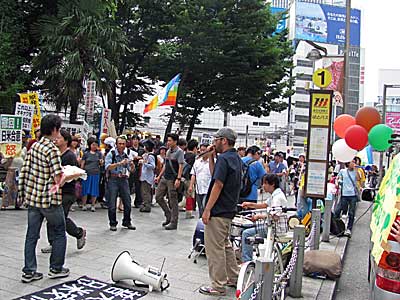 | 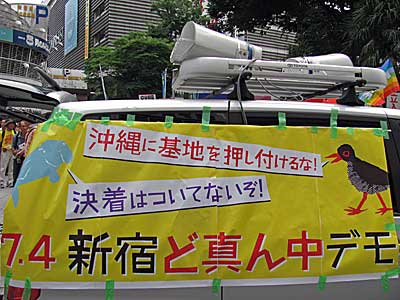 |
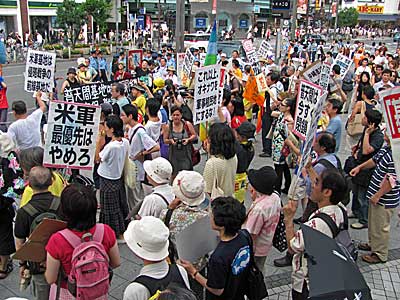 | 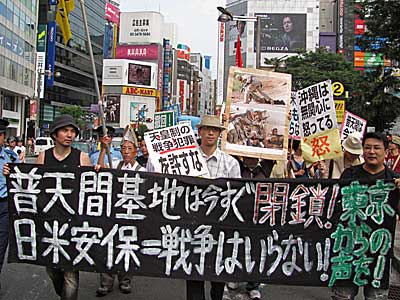 |
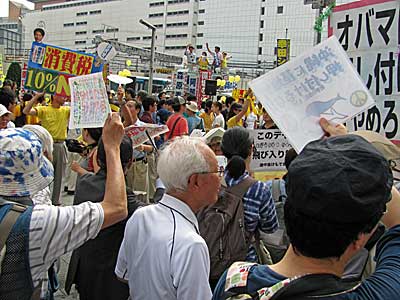 | 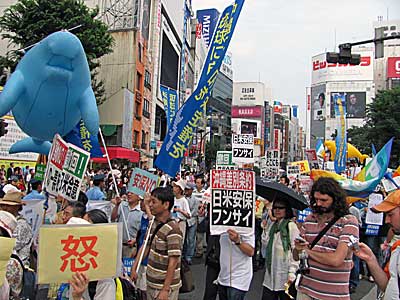 |
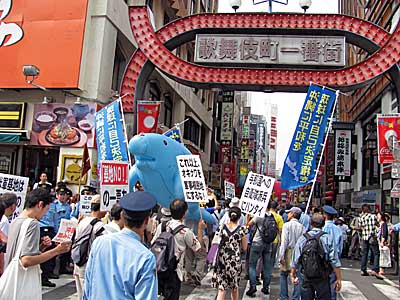 | 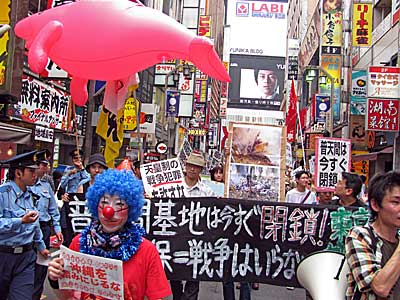 |
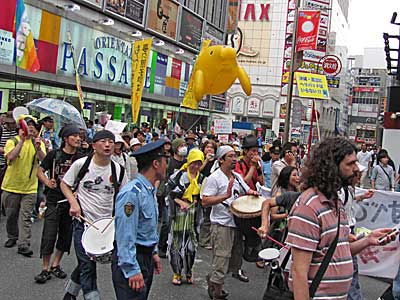 | 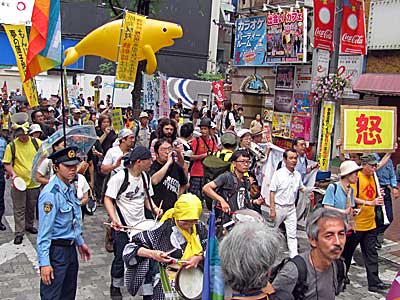 |
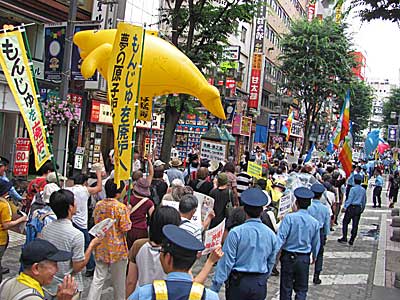 | 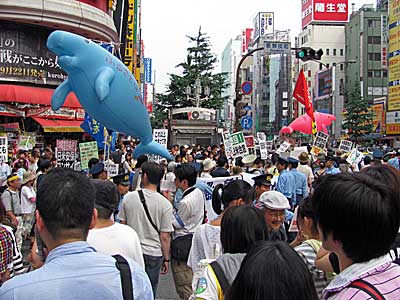 |
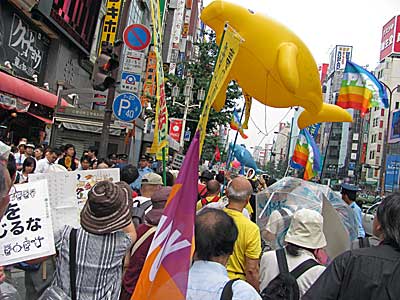 | 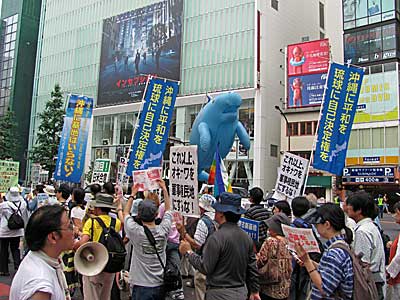 |
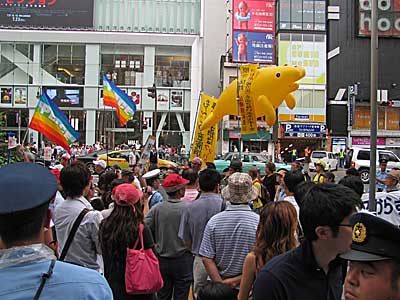 | 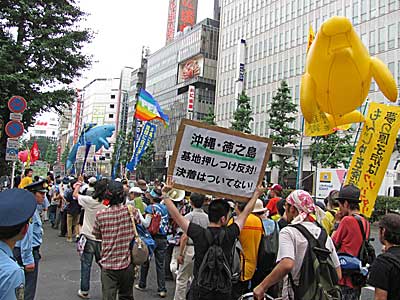 |
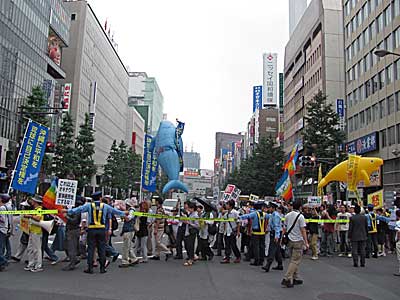 | 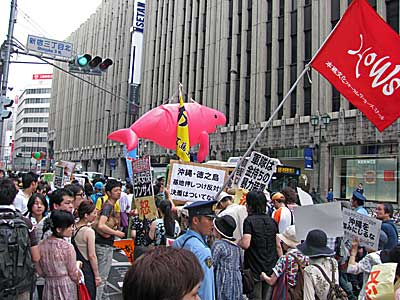 |
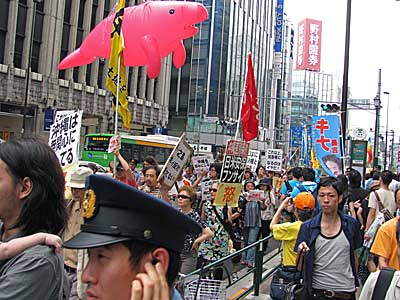 | 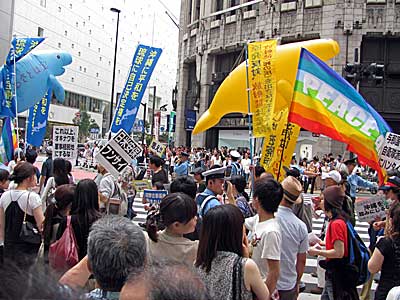 |
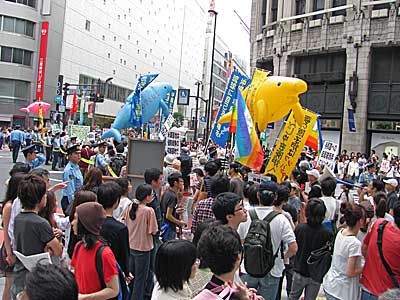 | 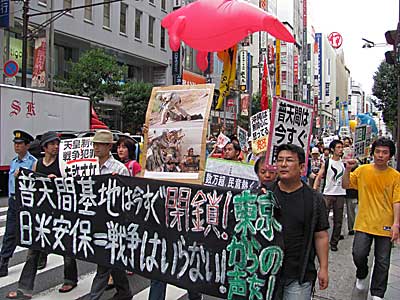 |
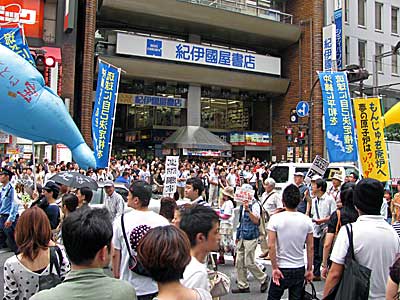 | 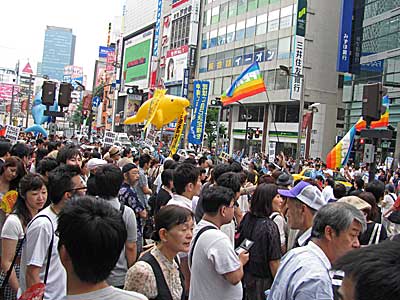 |
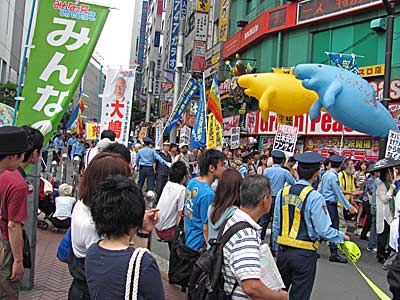 | 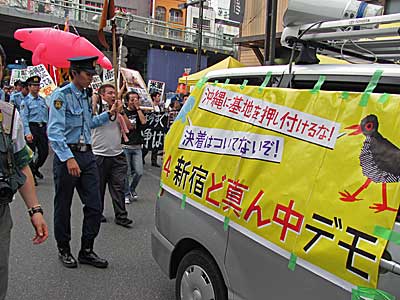 |
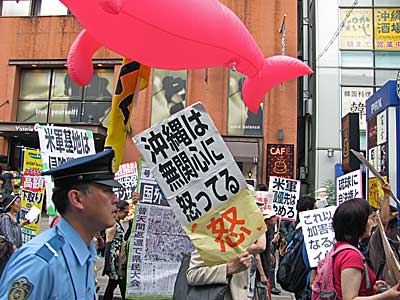 | 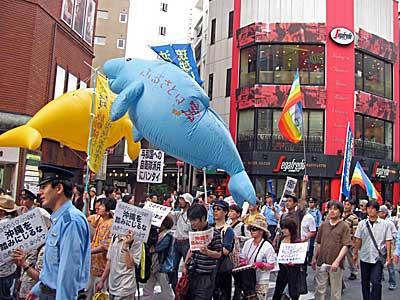 |
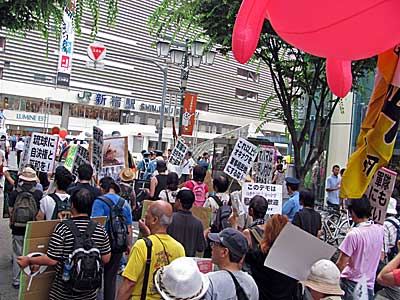 | 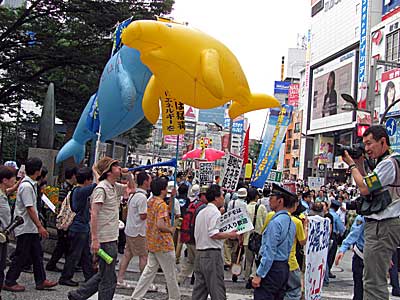 |
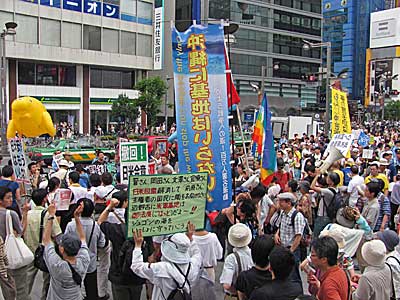 | 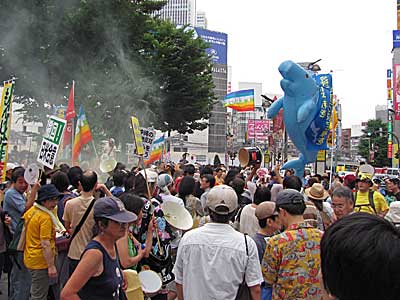 |
| 参院選スペシャル |
| 2010年5月30日(日) 沖縄を裏切るな! 新宿ど真ん中デモ |
| 2010年4月24日(土) 沖縄を踏みにじるな!新宿緊急デモ |
_____________________________________________________________________
Futenma Base Issue Leaves Okinawans Increasingly Disillusioned with Empty Government Promises
May 10, 2010
The prime minister had promised to move the US Marines air base "elsewhere in Japan, at the very least" and hinted that he had "a plan for an alternative location." Now that he has had to backpedal on those statements, Okinawans are increasingly convinced that believing the government's easy assurances will lead to greater hardship. Okinawa bears a heavy burden, with not only military bases, but also a growing population of unemployed drifters.
On May 4, Prime Minister Yukio Hatoyama changed his stance on the removal of Futenma Air Station from Okinawa. "I must apologize to the people of Okinawa. Moving [all the functions of this base] outside the prefecture has proven to be extremely difficult."
It had been Hatoyama's long-held view that the Marine Corps Air Station in Futenma should be moved "outside the country, and, at the very least, outside of [Okinawa] prefecture." Visiting Okinawa for the first time since assuming office, he was forced to concede that this was not possible.
The de facto conclusion is that the base will have to be relocated to the Henoko district of Nago. Hiroshi Ashitomi, the leading member of a group opposed to building a helicopter base there, is continuing a sit-in at the coastal site.

Hiroshi Ashitomi continues his protest sit-in in front of the proposed Henoko site.(Photo credit: Shinichiro Kaneda)
He had believed Hatoyama, until the prime minister reneged on his promise, and had called for calm among the increasingly frustrated protesters, "How could he have lied to the citizens of this country?" he now asks. "He should be ashamed, someone in his position!"
Hatoyama's about turn has caused Ashitomi to change his position as well. He raised his voice in protest at Hatoyama as his entourage stopped by Camp Schwab in Nago immediately after the public apology. "I absolutely refuse to end this sit-in," Ashitomi said. "We have succeeded in blocking the construction of military facilities. We can thwart this move as well."
Okinawa, a favored destination for the homeless
Ashitomi's resentment of the military bases stems from the hardships he and his family endured in the 1960s, when Ashitomi was still in his teens. His family had moved to Okinawa from Tokyo and tried to make a living farming, but a prolonged dry spell threatened to wipe out their crops. Ashitomi remembers carrying waste water from the house to the fields, and being shocked to see American military personnel showering and washing vehicles on the other side of the fence.
He recalls thinking, "This can't be right. Here we are, Japanese citizens living in Japan―why are we living under such terrible conditions?" It is this formative experience that moves him now to actively protest the relocation of the military installation in Okinawa.
Violent crimes committed by military personnel are not the only reason for local antipathy toward the military installations. While the most serious incidents have received national media attention, lesser incidents in everyday life have hardened the hearts of Okinawans against the military bases. Yet, they have also known that it will never be easy to remove the bases built when Okinawa was still under American control.
Okinawans were resigned to the status quo, but a nagging sense of injustice moved many to hope that Hatoyama could make good on his promise of last August to move the base "at the very least, outside of [Okinawa] prefecture."
"It was the prime minister himself that lit the fire," says an executive of a local firm. And now that the desire for change has been encouraged, it will take a great deal more than a contrite bow of apology from Hatoyama to calm the current unrest.
"Being obliged to host the bases has done tremendous damage to the economy of Okinawa," says Kohatsu Sesihou, chairman of Takunan Steel Co., the only steel refinery in Okinawa. He charges that "having the bases on land that would be highly valuable if it could be otherwise utilized has inhibited the development of our economy."
In the first place, a military-based economy can not continue to develop and prosper as the private sector can. When Okinawa was restored to Japanese control in 1972, earnings related to the US bases rose to as much as 15.5% of the population's gross income, but the figure has since fallen to about 5%.
It is relevant to note that throughout this period, the Okinawan prefectural economy has always been the least developed economy in Japan. Yearly income is 2,049,000 yen per capita, and unemployment stands at 8.0%―both figures are the worst in the country.
Besides these statistical testaments to the burden borne by Okinawa, there is a new social phenomenon that is impacting on the region's vitality. "Homeless people are coming to Okinawa from all over the country," says Masayoshi Yamauchi, a representative of the Promise Keepers, a non-profit organization. Drawn by Okinawa's warm climate, they come by ferry, and live outdoors in parks.
The NPO makes the rounds of parks in the Naha area by car every Friday and Saturday, distributing bread, juice, and snacks to the growing number of homeless people. These foods―mostly packaged foods that are near their best-by date―are donated by wholesalers and other businesses in the area.
The Promise Keepers also operate a shelter for the homeless. Before the financial crisis of 2008, there were 55 people living at the shelter; now there are 163. Almost half are from other prefectures. They include a 68-year-old man from Osaka who was found trying to hang himself at Ounoyama, a park by the Kokuba River in Naha. Another resident was taken in by the shelter after being arrested by police for trying to make his home at Naha Airport.
The organization tries to find work for the people at the shelter. Some ten firms are helping, offering work in construction, waste processing, and at a taxi company. However, fewer than 30 of the residents go to work every day, and increasing their motivation to seek regular employment takes time. Also, some residents have problems with substance abuse or alcoholism, and others simply drift off again.
The downsides of depending on the government
Yamauchi is sometimes asked if his organization is doing work that the government or local councils should be doing. He says no. For one thing, government employees only work regular hours, while the non-profit's activities demand more than that. Furthermore, he knows that a mentality of entitlement takes over when the homeless deal with the government.
For these reasons, Yamauchi declines public funds, soliciting donations instead from local businesses and individuals. His decision is characteristic of a growing consciousness in Okinawa―there is a groundswell of mistrust toward the government, particularly at the national level.
The citizens of Okinawa are keeping the government at arm's length, feeling instinctively that they will pay a heavy price later if they go along with its assistance measures. Their suspicions are down to a feeling that the government does not really understand what is holding Okinawa back.
One supposedly beneficial development was the drive to introduce casinos to Okinawa. Spearheaded by the tourism and construction industries, the push to establish "special zones" allowing casinos to operate was considered a high-potential initiative that would spark tourism. The plan excited considerable support at one point, as local citizens got behind the possible revival of Okinawa's economy.
This broad support quickly ebbed, however, when Keiko Itokazu, an Okinawan elected to the upper house, reported what she had seen on a study tour of casinos in South Korea. What she saw was a local society struggling with rising crime and gambling addiction.
"The reality," she said, "is a situation where women are even selling themselves to continue gambling. Simple fixes for the economy may be effective at first, but their effects are not lasting."
Homeless people at a park in Naha, Okinawa, gather for food hand-outs from a non-profit organization.(Photo credit:Shinichiro Kaneda)
Development that is right for Okinawa―that is what local citizens seek. Unsettled by the never-ending dispute over the military bases and forced to bear more than their share of Japan's social responsibilities, Okinawans have learned to see through the glib promises of their national government.
The latest upheavals set in motion by Hatoyama's promises are proceeding toward a worst-case resolution for the local populace. But it is because they have been disappointed yet again that they have begun to see the path they should take.
Ashitomi, who is continuing his protest sit-in at Henoko, has a plan for the area if the threat of military construction can be successfully thwarted: a world-class tourist destination featuring coral and dugongs, a manatee-like marine mammal. "It will be much more effective for economic development than a military base," he says. "We have a dream to pursue."
There is no way to know whether such a plan will be successful. That remains to be seen, and the dream may never even be put to the test. One thing is certain―immediate economic rationale is not the yardstick by which local sentiment or hopes for the future can be gauged. The rift between the state and the people of Okinawa is wider and deeper than could ever have been imagined.
~ ~ ~ ~ ~ ~ ~ ~ ~ ~ ~ ~ ~ ~ ~ ~ ~ ~ ~ ~ ~ ~ ~ ~ ~ ~ ~ ~ ~ ~ ~ ~ ~
SBS Dateline: Japan's Other Voices
"Why do we have to, and why do we still have to, host over 70% of US bases in Japan?"
Toshiko Shimabukuro, Okinawa Base Opponent
May 2, 2010
Last Sunday in Japan an estimated 90,000 people gathered on the island of Okinawa - The purpose of their exercise? To send a very clear message to both Tokyo and Washington that the giant US bases that dot the island are not welcome and should be removed. If that were to happen, it would fracture a 50-year relationship between the two nations, not to mention ripping out a vital strategic plank in America's defence policy. From the island some have labelled "an unsinkable US aircraft carrier" here's Adrian Brown.
REPORTER: Adrian Brown
Okinawa City on a Saturday night. The clubs and streets are filled with drunken marines. It's a menacing and seedy place - the result of what happens when young soldiers and a lot of beer get together. For decades, the catalogue of trouble caused by the more than 30,000 US troops living on the island has been growing, fuelling last Sunday's massive anti-bases rally. Not only was Washington put on notice but speakers including Okinawa's governor demanded that Japan's Prime Minister Yukio Hatoyama also honour a pre-election commitment to move the bases.
HIROKAZU NAKAIMA, GOVERNOR OF OKINAWA (Translation): As promised in the election campaign, solutions must be presented, on the Futenma Air Base issue, in particular – a responsible solution must be presented.
REPORTER: So these files all relate to cases involving the US military?
Criminal lawyer Ikemiyagi Toshio specialises in cases involving the US bases.
IKEMIYAGI TOSHIO, CRIMINAL LAWYER (Translation): The most common are traffic-related accidents, firstly some are caused by soldiers drinking and driving, there are hit-and-runs some resulting in death. Apart from hit and runs, there are other fatal accidents caused by negligence. We have a lot of such accidents. Besides those, there are a lot of sexual crimes committed against women.
In 1995, anger erupted after four marines gang-raped a 12-year-old girl. The last reported rape was two years ago, and involved a 14-year-old girl. But according to Barack Obama's top diplomat for East Asia, the behaviour of the US forces has actually been improving.
KURT CAMPBELL, US ASSISTANT SECRETARY OF STATE: I think the more important feature of the last 15 years is that you will note in that period of time that the incidence of crime is far below the national levels in the United States and so you've seen a thorough-going improvement in the behaviour and the activities of deployed American forces in Okinawa over the course of the last 15 years or so.
However Ikemiyagi Toshio tells me the statistics are misleading because many more sex crimes go unreported.
IKEMIYAGI TOSHIO (Translation): The US soldiers live within the bases and that makes it extremely difficult for an individual to file a suit against a US soldier. So in many cases the victim just gives up.
This is the big Futenma air base located right in the middle of the city of Ginowan. It's one of 12 bases on the island. This photo shows just how densely packed the surrounding residential areas are. It is home to 4,000 marines, who train regularly, ready for deployment to Afghanistan. Okinawa is a strategic gem for the US located close to mainland China, Taiwan and North Korea. Now it's all threatened by the anti-bases movement. Because of the sensitivity of this issue, few journalists are allowed onto Futenma base. It's become the fault line in the US-Japan defence alliance. Both governments agree this camp has to close. The sticking points are though when it will happen and more importantly where it will be moved to.
From the roof top of Okinawa International University you get a direct view of the air base. But it's a view university president Moritake Tomikawa has grown tired of.
REPORTER: When do you want the marines to go?
MORITAKE TOMIKAWA, UNIVERSITY PRESIDENT: Right now, right now.
REPORTER: Right now?
MORITAKE TOMIKAWA: Yes, as soon as possible.
In 2003, the then US Secretary of State, Donald Rumsfeld, called Futenma air base "an accident waiting to happen". A year later, he was proved right when a US helicopter crashed into the university. Incredibly no-one was killed but an administration building was destroyed. The Americans sealed off the area, denying access even to Japanese emergency services.
REPORTER: Do you worry there might be another accident here?
RITAKE TOMIKAWA, PRESIDENT, OKINAWA INTERNATIONAL UNIVERSITY: Sure - Every day. I feel so. Yeah, I worry about that. We have over 6,000 people here so I worry about that crash again - whenever I saw the helicopter flying.
In 2006, Washington and Tokyo finally agreed to move Futenma to another part of the island. But late last year, Japan's new Prime Minister suggested the base should be shifted off Okinawa altogether. The deal was put on hold and a 50-year-old military alliance came under strain.
REPORTER: When will the marines and their aircraft be leaving Futenma?
KURT CAMPBELL: I can't answer that question. In fact, I will tell you quite honestly, I've been working on this matter for almost 15 years and I would've thought it would've been resolved long ago. The problem, of course, has been a new government - a government very different that the preceding government - has come to power in Japan, and they have a different conception, or at least they had a different conception, about some specifics associated with the US-Japan security relationship, and we have yet been able to gain a full understanding from them on what's the best way forward.
Hajime Kanai knows these waters well. They boast coral reefs, tropical fish and the endangered dugong. Technically these are American territorial waters because of what stretches along the coastline here - another sprawling base, Camp Schwab.
REPORTER: Everything here is American? All these waters?
HAJIME KANAI, ANTI BASES PROTESTER: Yes, but we think this is Okinawan sea.
REPORTER: Beautiful, clear water.
In return for closing Futenma, the Americans want to shift air operations to Camp Schwab. The plan includes a proposal for a new runway inside the base. But another more controversial option would bury part of this picturesque bay under a V-shaped runway.
HAJIME KANAI (Translation): There are a few reasons. One - I don't want them to destroy the beautiful sea of Okinawa and secondly - I want to protect the precious creature, Dugong, Butt. 20% of Okinawa is occupied by the US bases. It is upsetting - put daily lives - it is an undesirable existence.
Clearly visible from the boat is the American razor wire that divides Henoko beach. The fence is festooned with colourful banners and protest notes. Among the visitors today, tourists from Tokyo, keen to know what will eventually happen here. The keep-out sign was not enough to deter him. Another sign of growing Japanese defiance - A defiance you also find at the heart of Japan's government. 1,600 kilometres away in Tokyo, I've come to meet an outspoken member of the Japanese Cabinet.
MRS MIZUHO FUKUSHIMA SOCIAL DEMOCRATIC PARTY: Nice to meet you, thank you.
REPORTER: Thank you for sparing the time to see us, I know you're very busy at the moment.
Mizuho Fukushima is head of the left-leaning Social Democratic Party and a staunch opponent of the relocation plan.
MRS MIZUHO FUKUSHIMA: I want to emphasize that plan will not be able to realize. One point with that, people dislike such plan. Most people don't agree and every persons, every politicians in Okinawa prefecture oppose that plan.
While the echoes of last week's demonstration are being heard in Tokyo and Washington, this weekly ritual outside Camp Schwab has been going on for six years. A small group of protesters, most of them pensioners, are busy decorating the perimeter fence. Many remember when the Americans first arrived in April 1945 and have resented their presence ever since. In the past, there have been clashes with the police, but today the demonstration is peaceful.
HIROSHI ASHITOMI, ANTI US BASES PROTESTER (Translation): I want to emphasize the worst plan is the island plan.
Their leader is a retired civil servant who says the protests will continue until the relocation plan is dropped.
HIROSHI ASHITOMI (Translation): The destruction of the environment is one of our strongest concerns. There are sea turtles, dugong, and a coral reef here. By destroying the environment here it might drive some of those species into extinction.
Okinawa is etched deeply in the memory of both Japan and America. The battle of Okinawa was the bloodiest of the Pacific War. The island's memorial park commemorates 200,000 Japanese troops and civilians who lost their lives. More than were killed during the atomic bombings of Hiroshima and Nagasaki. Over 12,000 Americans also perished.
TOSHIKO SHIMABUKURO (Translation): We did not know how terrifying a war was, we did not think that our friends will die like this.
Toshiko Shimabukuro was a 17-year-old schoolgirl when the invasion began. She was treated by American medics after being shot in the leg running for cover.
TOSHIKO SHIMABUKURO (Translation): I wonder why the military bases exist in islands that had over 200,000 people dying 65 years ago? But they seem to be trying to build stronger base with stronger foothold here. We would like to ask the US why they do not consider the lives of Okinawans? We ask ourselves, what is Okinawa? And ask if they would think of what we went through even before the war. We do not want the bases. I wish the US would be more considerate towards Okinawa.
Japan has to pay more than $2 billion a year towards the cost of supporting the US presence. Washington insists that this allows Japan to hold down its defence costs in line with its pacifist constitution.
KURT CAMPBELL: Overall it's one of the best deals imaginable for a country like Japan that spends less than 1% on its national defence but at the same time has the robust and very firm commitment on the part of the United States to maintain peace and stability and indeed the security of Japan.
But Tokyo now says it wants a more equal partnership with Washington and the flashpoint of this marathon debate is Futenma.
MIZUHO FUKUSHIMA (Translation): Of course US-Japan bilateral relationship is of utmost importance. But US itself said it is not beneficial for the US Government to have a base surrounded by hostile sentiment. 75% of the US bases in Japan are concentrated in an area only 0.5% the size of Japan, why should Okinawa accept another base.
The anti-base campaign received a boost earlier this year in the nearby city of Nago. Voters elected a mayor who had campaigned against the expansion of the US military presence. The results reverberated around the country. One national daily said the biggest loser was not the victor's opponent but the Japan-US Defence Alliance. Later Japan's Prime Minister Yukio Hatoyama said "The people had spoken" and promised to settle the issue once and for all.
YUKIO HATOYAMA, PRIME MINISTER (Translation): My government has said it will take responsibility and settle this issue by the end of May. We will definitely carry this out.
The new mayor has no say in national policy, but still insists it's now impossible for the air base to be moved here.
SUSUME INAMINE, NAGO MAYOR (Translation): As for the new plan with a V-shaped runway, the base would be bigger than the current air station an expansion not only in size but in functions is incorporated in the plan. What would the consequences be? Futenma is said to be one of the most dangerous bases in the world and the new base would expose the residents to even bigger risks.
But almost 50% of the electorate didn't vote for him and doesn't support an anti-base stance. Masatake Kyoda is an unemployed construction worker. He heads a group that wants the base to come to this area because of the jobs that would follow.
MASATAKE KYODA (Translation): If the base is to come, we'll insist on our terms that will benefit the community and our children in the future.
Here in Henoko, shop after shop in the main street is shuttered by the economic downturn. Young people are leaving to find work elsewhere. It's a dying town.
MASATAKE KYODA (Translation): The issue is going over our heads. Our community is in a state of limbo.
It's not jobs this gaggle of protesters worry about. They are ardent supporters of Japan's defence pact with America. They fear that Okinawa without the bases would leave the country militarily vulnerable.
SHIGEKO OBARA, PRO BASES SUPPORTER: China is trying to invade our country step by step.
REPORTER: Do you think that would happen if the American bases were closed?
SHIGEKO OBARA: Yes, Yes. It gonna happen. Yes, yes.
At the US State Department in Washington officials know they have to tread carefully right now. But it is impatient to end the months of uncertainty.
KURT CAMPBELL: So we are coming to that stage now where we're expecting our friends in Japan to take the appropriate steps. So I wouldn't say frustration, but a gathering anticipation that we are about to see some real steps. But I think a larger point, Adrian, must be made, that although we are concerned and we do care deeply about the people of Okinawa, there are larger issues at play. The US-Japan relationship, in many respects, transcends local communities and this is fundamentally not just about public opinion in Okinawa, it's about decision making in Tokyo and indeed in Washington.
Last week's rally has upped the pressure on both sides, but particularly on Japanese Prime Minister Yukio Hatoyama. Almost half the respondents in a recent opinion poll said that the Prime Minister should resign if the relocation issue isn't settled by the end of May.
YUKIO HATOYAMA (Translation): I believe that the extremely huge rally held by the people of Okinawa was definitely an indication of public opinion. We'd like to reiterate that we hope to further ease the burden of the Okinawa people and eliminate the dangers of Futenma airbase. I will continue to make efforts with this thought in mind.
Whatever decision is made later this month - one thing is certain, the US-Japan relationship is changing.
KURT CAMPBELL: Japanese want to know more, they want to be consulted more actively, they want to be engaged in decision-making. I think that's entirely appropriate. This will also demand and require changes in how the United States conceptualises its relationship with Japan and I believe we're in the midst of trying to do that right now.
GEORGE NEGUS: And if you want to tell us what you think of those US bases in Japan go to our website, where there's a forum where you can voice your comments and opinions on all of our stories.
Reporter/Camera
ADRIAN BROWN
Fixer
TERRENCE TERASHIMA
Producer
VICTORIA STROBL
Researcher
DONALD CAMERON
Editor
NICK O’BRIEN
Translations/Subtitling
HIROKO MOORE
Stills courtesy of the City of Ginowan








![[URGENT PLEA: In Update] EMERGENCY in GANGJEONG Since AUG. 24, 2011](https://blogger.googleusercontent.com/img/b/R29vZ2xl/AVvXsEiQvpaNf6EePZVucu97_JphYsFS5IgumnSiA4YAmen1PZcim6vMmW7XjZ7J6nLh-Cu36mwBN5n1evrA3ey0vYMpwlAGsgnSFggv6a1w4Qx9BvvqOB0hy0BIcBkL2Exfs3zIxBsBuDGa1kzg/s227/jejusit.jpg)



![[Solidarity from Japan for the Jeju] 253 individuals and 16 groups/organizations](https://blogger.googleusercontent.com/img/b/R29vZ2xl/AVvXsEivji7100kBkr0hzvqYfh4IBBilkZ6XgDIg89jOxS6kTssxsVKC6Wm-fZbKOEsiy3zcO-9gW6GHspD5R_2C9WsGx5S1Z5VPj_OVRF7H6dxdaT0S-2H1eqsDsYvIwOV26VscxTHnKmP5iZmh/s227/jeju_12_10j.jpg)

![[Translation] Korean organizations' statement: Immediately cancel the joint ROK-US drill Nov 26](https://blogger.googleusercontent.com/img/b/R29vZ2xl/AVvXsEgfKDMo-qyEjm5asUtHlREyJY_5Ou-2tyB8SH6aUxiViRbbKR-8W_rirFiGp5DYSoD_KaeNOPMWR0af0ZPUIbJKmR89ImDvADHsGAIqsJVBvJNBEIl5wLd3G_zhPDW3Z2SxsHXadOsXe8st/s227/1.jpg)
![HOT! [Hankyoreh Hani TV] Beneath the Surface: the investigation into the sinking of the Cheonan](https://blogger.googleusercontent.com/img/b/R29vZ2xl/AVvXsEh80rL3Qv9GnfHSqbYMfivdqX5gZN-1O_VQj3A_Gk3yjWdybHwJCsprA3l6cEQB0cYCP2oNeaLo2ohLGIy0Uqqkv_fRkBevGJ2f-qkKD5eP1ZGsKeQ-r-jHUUb79WvucIN7hpEtXza4xXCL/s227/HaniTV+Cheonan.gif)



![[Translation]Statement against illegal inspection and unjust lay-off by the Kunsan USAFK!(Nov_2010)](https://blogger.googleusercontent.com/img/b/R29vZ2xl/AVvXsEg3JlQ-lreusCIJo5Yv2e3ZrRwrSMUE7UQxlrDVjmBehl0Pa24QZIAbZ5vUpgnnExbkKL9PdCwxVYSHWJkr_XK0FM4EhU3CMFhqfborVNu_p4v3bEFpNm3ia-aEHnvMMuEBI27aB7_BETuJ/s227/gunsan+protest.gif)
![[Translation] Korean organizations' statement against dispatching special force to the UAE on Nov.](https://blogger.googleusercontent.com/img/b/R29vZ2xl/AVvXsEiU7TNhTDLLwZkKP0Z78JsCZKp6je-QSFll3_ThmLES_y_nPLXEzeakrsZXoNxhN5blopEhy6xGV2tneJrniPdTR-JvOQMmSLr_HhlucxFvbusxk4oKvvMO2laBOHSIkB9OOeOxrQlqCA0O/s227/antiwarpeace.jpg)
![[Translation] Stop, Joining MD!: South Korean activists' statement and writing on Oct. 25, 2010](https://blogger.googleusercontent.com/img/b/R29vZ2xl/AVvXsEggGIHVei8j7LCJPJB5HIrspd942q436daNTquP-pFd45Cl70Ml_1JFiFDHgKu6FcoqNgFVKIFqjeuSPau2k_BwGHhx0cqFFL2-4ybZSTlmua0_AsERBtKYQa7jZk7uNj41LX6rj2vksHbo/s227/StopMD.jpg)
![[In Update] People First, NO G-20 (Nov. 6 to 12, Korea)](https://blogger.googleusercontent.com/img/b/R29vZ2xl/AVvXsEhZl8VTqeL7o2ndliGIE-sZFCikbTgfB9KCc3AtZvDaYijBBEhdfultMEOpyrCaD5gzpH8mqfWjU20KXMbSUl-5KM7yQeHU6z3BWV8tiOy4UKaCudz9VKWoi5x58xdC_gQpJTjkR5u7O9xf/s227/left21_G20.jpg)
![[International Petition] Stop US helipad plan in Okinawa to save great nature](https://blogger.googleusercontent.com/img/b/R29vZ2xl/AVvXsEihgYmdb0N8ViPvTFC_5i-Psbt4eX_LnAUEOtZkUngv_pGvRyWag1r6W60NicLLyTgWq-sPT1hBxLY5SadEIVv5McfZQ5uIhe-W0VoflQNqojsYZjFW6AH-gB1jsmSDGnGuKIFk2UkvNbFG/s227/yanbaru_w.jpg)

![[Global Network] against the first launch of Quasi-Zenith Satellite, Japan, on Sept. 11, 2010](https://blogger.googleusercontent.com/img/b/R29vZ2xl/AVvXsEj2sYpfodDDMIA7qXwuda0DmKapxXFB479fDnn8RKy7QNZqz0VEvWucNd-DleZ37hWNXC-Z8QtaqtM37VuPwac5SgclJ9_khBBSWOedvm19MRXIP1j1kcWrK6EW5IFjQdEEY2h7E6xuyNvC/s227/Qzss-45-0_09.jpg)

![[In update] Some collections on the Koreans’ protests against the sanction & war on Iran](http://4.bp.blogspot.com/_gnM5QlRx-4c/TJMvke6t8zI/AAAAAAAAFO4/tamQ8LUnOOA/S227/No+Sanction+on+Iran.jpg)
![[Three International Petitions] to End the Korean war and peace treaty(or peace resolution)](https://blogger.googleusercontent.com/img/b/R29vZ2xl/AVvXsEhlohLVYtpCg7iMsZhNYY4hBbhTi2dIheHMHWLDph9X2y78cjgZV1LeSfUJeu80elhJm70Q9E059q72lK-spSPvsRG4bPuCDIytltJB9IH3mWt9OG98HqhnTsPakwhvNeoCFUgF1xoxQ2EZ/s227/border.jpg)



![[Collection of Documents] No Base Learning and Solidarity Program_Korea(June 14 to 20, 2010)](https://blogger.googleusercontent.com/img/b/R29vZ2xl/AVvXsEix_HzjToh3nNGHBc-_5gasq-ykcaZ6GInLixILmZVyRJ5xoeHCxWOyYd9fSM7bmnuFsjSrYOGEPnQOwB1Dcyo-sN4Pw0cFPhUtKig_qlVnGL1Wi82ClvPqbEPWYhJiqdNF0DyzLIBETMB9/s227/No-Base-banner.jpg)
![Site Fwd:[John Hines] A U.S. Debate coach’s research trip on the Issues of Korea](https://blogger.googleusercontent.com/img/b/R29vZ2xl/AVvXsEg8yRra0zNhKHN74Auqhd3Nx9tZ7BWCGflRJHGH4CfzBT_yjhZ8Nl9b3OZuLpYWJ2exsjmR0oVl-Qq_cf832p2VdmOZhUi-lCFzCNeDSyVtweX1lWZPC-RlHmDMLtilHwHjNFTenBiM4Fk4/s227/Jeju-Peace-Tour.jpg)


![[News Update] Struggle Against the Jeju Naval Base since Jan. 18, 2010](https://blogger.googleusercontent.com/img/b/R29vZ2xl/AVvXsEhKfSTRC5QKBBSFIq_m7QIqXdlbL4-gF5GJYn9Q-pN__k7sV7uxGDcLY5L8xmU7QuWuUhBT_GhG-URBPO80RT3AfWfDrWJr06h1hFuZC6ZBVKe4U6PS1Cd7Kr6olO8TYQtk13Drox7IS6ea/s226/scrum1.jpg)


![[Urgent] Please spread the Letter!: There was no Explosion! There was no Torpedo! (May 26, 2010)](https://blogger.googleusercontent.com/img/b/R29vZ2xl/AVvXsEhSd2yWZ3xGwnJQXB73z5FgXCqSosAoB9_33-GLYprOmLqjmvgSAQp1BYI7e4slK1FDxHRi9KK4um-OpDaj8QOkXwAScVAgvvq6-ehbDA-hbkr96wT9oHNNmWnBPv8GU4hoZp9X8F9AZBX4/s227/grounded.jpg)
![Text Fwd: [Stephen Gowans]The sinking of the Cheonan: Another Gulf of Tonkin incident](https://blogger.googleusercontent.com/img/b/R29vZ2xl/AVvXsEi_L6hB3RZ1MovTXHe0A8yn_RfgMALGR0kM6poBuGp809xwvHtB_-PGWtS_WpyPWatyd9lB2pPqL2gOLc4dTCEdJ9sMvxJWEdapl-mMLm7WHAsV-jVpgqarVh8XBtdz_0c-Vohdh3HtJahD/s227/lee-myung-bak.jpg)
![[Japan Focus]Politics in Command: The "International" Investigation into the Sinking of the Cheonan](https://blogger.googleusercontent.com/img/b/R29vZ2xl/AVvXsEiHmTo8v-uCJnabRhMdnBAkC9J3s5bb2JsDKiT5leJHwbK8IDJHxfJmqQ_C0Is_bPC6UGMf05CA0exF2y4r2x9RhFUHT0kjsKviaME_MZXKnq775UyYAdb7w2SAzE75XvBfHp1al2q6i3cf/s227/wen_jiabao_and_lee_myungbak.png)
![[Japan Focus] Who Sank the SK Warship Cheonan? A New Stage in the US-Korean War and US-China](https://blogger.googleusercontent.com/img/b/R29vZ2xl/AVvXsEiKSS5ULT5QBaMGYpXXqBMX9jtwLwMLuK469b6Ku72GTJYKUObzTANaPjZqvvpPzYMJgPF53sjhvhK3DVa88ipYlggsJageykXlkxY6s8TW05xcU-_vfhf-pACUoaWuFbT-fsU1qEhm_yIi/s227/buoy_map.gif)
![[Updated on 12/13/10] [Translation Project] Overseas Proofs on the Damages by the Military Bases](https://blogger.googleusercontent.com/img/b/R29vZ2xl/AVvXsEikADE6JovUNspQyZUWVMTLAQg7yQNqXpVUbqZPk8f4uc_1723_xm1Cco6WAmstQXVPnaJAcb1mZA8Ny_3xONT_f5uh8MNLPnUhtqdGgy3HCtC1Vbbz4Q0ZY1Cssu-4cJEVNdrvznbS5UzO/s227/missile.jpg)
![[International Petition] Close the Bases in Okinawa](https://blogger.googleusercontent.com/img/b/R29vZ2xl/AVvXsEhNpQiHklwFbWVlFK7GDFXnBSOOSFEj3Il-We-N3uTDldKiidL2NGZs7X_LtTnatzTo_r8CexRkFe8NhfxYqmgp1knEEslROTfNjI5_mSb57cdbhPkftvanveYBaevAD9xuKDGoIxiTwoSb/s227/2.jpg)

![[In Update]Blog Collection: No Korean Troops in Afghanistan](https://blogger.googleusercontent.com/img/b/R29vZ2xl/AVvXsEjjEmCRXSNAG7_QBxKWbdksmxoWR4nyAovQTTdR1G2AuXh0jxtqNkI9OmYgYWRoLAJShvtBvE840QXuBWSVh3u3zMYqkNAFX6OWy3m5Nur4HM7uNK-pKT1ycyApJp-VLyhIFRRcoisYAh0E/s226/No-Troops-to--Afghanistan.jpg)











No comments:
Post a Comment